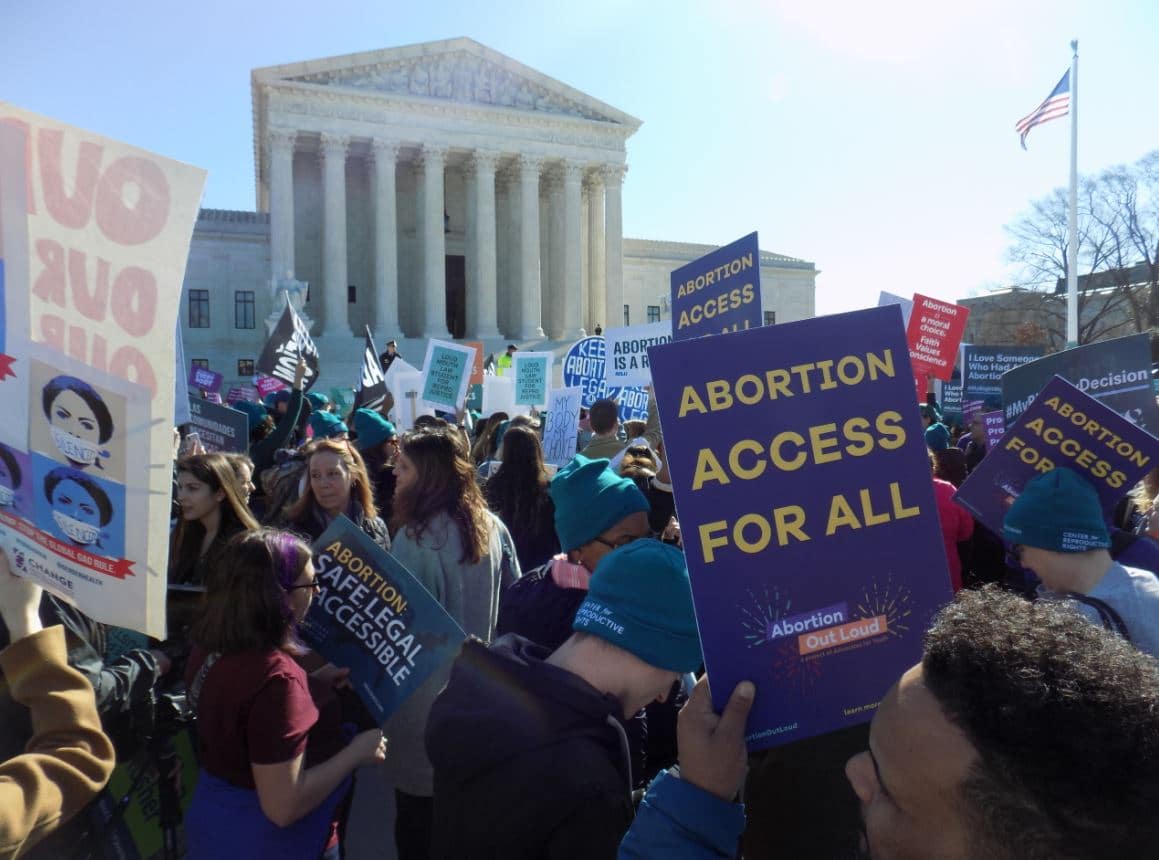Supreme Court Strikes Down Louisiana Abortion Clinic Law

WASHINGTON – The Supreme Court on Monday struck down a Louisiana law regulating abortion clinics, reasserting a commitment to abortion rights in the first big abortion case of the Trump era.
Chief Justice John Roberts joined with the liberal wing of the court in ruling that the law requiring doctors who perform abortions have admitting privileges at nearby hospitals violates the abortion rights the court first announced in the landmark Roe v. Wade decision in 1973.
In two previous abortion cases — including a case on which he said he based his position Monday — Roberts had favored restrictions.
At issue in June Medical Services LLC v. Russo was Act 620, a law passed by the Republican-controlled Louisiana legislature in June 2014, which required “that every physician who performs or induces an abortion shall ‘have active admitting privileges at a hospital that is located not further than 30 miles from the location at which the abortion is performed or induced.’”
A number of abortion clinics challenged the Act in federal court, and while that challenge was pending the U.S. Supreme Court struck down a nearly identical Texas law in Whole Women’s Health v. Hellerstedt.
In that case, the justices found the Texas law imposed an “undue burden” on a woman’s right to have an abortion while bringing about no health-related benefit and serving no “relevant credentialing function.”
In light of the Supreme Court ruling, the district court declared the Louisiana law invalid and permanently enjoined its enforcement.
In handing down its ruling, the district court said the admitting privileges served no relevant credentialing function and noted that physicians are sometimes denied such privileges “for reasons unrelated to [medical] competency.”
The district court further determined that the law would “drastically burden women’s right to choose abortions.”
Louisiana appealed to the 5th U.S. Circuit Court of Appeals, which concluded the district court was wrong because the Texas and Louisiana cases had one fundamental difference. Unlike the Texas case, it anticipated that “no clinics will likely be forced to close on account of the Act.”
As a result, it said, the Louisiana law would not impose an undue burden on a woman’s right to choose abortions.
But Justice Stephen Breyer, writing for the majority on Monday, said it was the 5th Circuit that erred in its reasoning.
In his view, the Louisiana law is “almost word-for-word identical” to the law struck down in Whole Woman’s Health, and he noted that the district court in this case found the statute “offers no significant health benefit” but “will continue to make it impossible for abortion providers to obtain conforming privileges for reasons that have nothing to do with the state’s asserted interests in promoting women’s health and safety.”
Breyer said this inability of abortion providers to obtain conforming privileges “places a substantial obstacle in the path of women seeking abortion.”
“We have examined the extensive record carefully and conclude that it supports the District Court’s findings of fact,” the justice concluded. “Those findings mirror those made in WWH in every relevant respect and require the same result. We consequently hold that the Louisiana statute is unconstitutional.”
In a concurring opinion, Chief Justice Roberts acknowledged that he dissented in Whole Woman’s Health, and continues “to believe that case was wrongly decided.”
“The question today however is not whether Whole Woman’s Health was right or wrong, but whether to adhere to it in deciding the present case,” he wrote.
“The legal doctrine of stare decisis requires us, absent special circumstances, to treat like cases alike. The Louisiana law imposes a burden on access to abortion just as severe as that imposed by the Texas law, for the same reasons. Therefore Louisiana’s law cannot stand under our precedents.”
Justice Samuel Alito, Jr. wrote the main dissent, which was joined in bits and pieces, by the other conservative justices.
“Today’s decision claims new victims. The divided majority cannot agree on what the abortion right requires, but it nevertheless strikes down a Louisiana law, Act 620, that the legislature enacted for the asserted purpose of protecting women’s health,” Alito wrote.
“To achieve this end, the majority misuses the doctrine of stare decisis, invokes an inapplicable standard of appellate review, and distorts the record,” he said.
Alito goes on to say the majority ignored the “undue burden” test the Supreme Court itself crafted in its ruling.
The plurality eschews the constitutional test set out in Planned Parenthood v. Casey and “instead employs the balancing test adopted in Whole Woman’s Health,” Alito wrote.
“The plurality concludes that the Louisiana law does nothing to protect the health of women, but that is disproved by substantial evidence in the record,” he continued. “And the plurality upholds the District Court’s finding that the Louisiana law would cause a drastic reduction in the number of abortion providers in the State even though this finding was based on an erroneous legal standard and a thoroughly inadequate factual inquiry.”
Justice Clarence Thomas also responded bitterly to the majority’s ruling, saying it “perpetuates its ill-founded abortion jurisprudence by enjoining a perfectly legitimate state law and doing so without jurisdiction.
“As is often the case with legal challenges to abortion regulations, this suit was brought by abortionists and abortion clinics,” Thomas wrote. “Their sole claim before this Court is that Louisiana’s law violates the purported substantive due process right of a woman to abort her unborn child. But they concede that this right does not belong to them, and they seek to vindicate no private rights of their own. Under a proper understanding of Article III, these plaintiffs lack standing to invoke our jurisdiction.”
Breyer answered this suggestion that clinics have no standing to challenge restrictive state abortion laws in his opinion.
“We have long permitted abortion providers to invoke the rights of their actual or potential patients in challenges to abortion-related regulations,” he wrote.
























